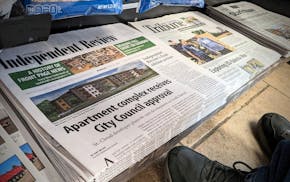U.S. Catholic bishops meet this week with an agenda item sparking controversy in Minnesota and the nation: drafting a document that would ban pro-abortion rights Catholic politicians, such as President Joe Biden, from receiving communion.
The U.S. Conference of Catholic Bishops, meeting Wednesday through Friday, is expected to vote on whether to create a "eucharistic coherence" policy to establish criteria for worthiness to receive the sacrament.
The move reflects the so-called "communion wars" in the Catholic Church, which have intensified since the inauguration of the nation's second Catholic president. Abortion opponents insist it's impossible to be both a pro-abortion rights leader and an authentic Catholic. Critics argue that the bishops are politicizing their most sacred rite and that it conflicts with the teachings of Jesus.
Minnesota's estimated 1 million Catholics have mixed reactions to the proposal. Michelle Hybben is among those who support a ban.
"If you're not taking abortion seriously, how can you take the eucharist?" said Hybben, heading to mass last week at the Basilica of St. Mary. "It's like a slap on the face [to the church]."
Clarence Shallbetter, nearby on the basilica steps, disagreed.
"Judging everyone receiving the eucharist is not the task of the church," said Shallbetter, a Catholic deacon. "The purpose of the church is to bring people in, open their hearts, and experience the love of Jesus."
Other Catholics, such as Jose Chiang, grapple with what they consider a very difficult issue. Chiang and his wife, Esther, strongly oppose abortion, but they're not sure that Catholics should be denied communion if their views differ from the church. Esther Chiang still has sad memories of her mother being denied communion because she didn't marry her father.
"Communion represents the bread that Jesus gave at the Last Supper," said Jose Chiang. "Everyone received it, including Judas, the traitor. I think this is something for God to decide."
The conference is unlikely to dictate any immediate change of church policy, as any document produced must be approved by the bishops at a later meeting and go through Vatican channels. But the very public way the issue is being handled by the bishops is highly unusual, Catholic experts said.
Proposal not new
Discussions over a possible communion ban are not new. Some U.S. bishops pledged to withhold communion from then-presidential candidate John Kerry, a Catholic Democrat, in 2004 because of his abortion rights stance.
The latest and most high-profile push, driven by a group of conservative Catholic bishops, has generated headlines and drawn reaction across the nation and world.
In May, Cardinal Luis Ladaria, prefect of the Congregation for the Doctrine of the Faith — the Vatican office overseeing church doctrine — sent a letter to the U.S. bishops conference that discouraged a vote on the communion issue, saying such a document "could become a source of discord rather than unity" within the church.
Ladaria also said it would be misleading to present abortion and physician-assisted suicide as "the only grave matters of Catholic moral and social teaching that demand the fullest accountability on the part of Catholics."
The urgency among some bishops was sparked by Biden's overturning of some abortion restrictions upon taking office and his support of issues such as same-sex marriage, both of which conflict with Catholic teachings, said Robert Kennedy, a professor of Catholic studies at the University of St. Thomas.
"The bishops are concerned [over] what a Catholic moralist would call 'scandal,' an action or speech that leads others into sin," said Kennedy.
Others view the communion document as more of a political than a religious move, a way for bishops to shore up support for anti-abortion public officials who are overwhelmingly Republican. House Speaker Nancy Pelosi, another Catholic Democrat who supports abortion rights, is among other politicians that bishops are watching.
A recent poll by the Pew Research Center shows that political affiliation and support for a communion ban are closely linked. Overall, two-thirds of U.S. Catholics support Biden's right to receive communion. But that breaks down to 82% of Democratic and Democratic-leaning respondents who oppose a communion ban, compared with 49% of Republican and Republican-leaning respondents.
The issue has generated divisions within the ranks of bishops as well as their flocks. Last month, 67 of the 260 bishops signed a letter to the bishops' conference president, asking to delay a communion vote until the bishops can meet in person (this week's meeting is virtual).
St. Cloud Bishop Donald Kettler is among those who signed the letter.
"I feel this respects the counsel given to us by the prefect of the Congregation for the Doctrine of the Faith to take the necessary time for dialogue and discernment on this issue so that any teaching document that might result from such discussions would foster unity and not more division," Kettler said, in a statement to the Star Tribune.
St. Paul and Minneapolis Archbishop Bernard Hebda said he looked forward to the diverse perspectives at the bishops' meetings. Auxiliary Bishop Andrew Cozzens, who heads a bishops' conference committee on eucharistic revival, believes some political leaders need to appreciate Jesus' "real presence" in the eucharist.
"The struggle of Catholic politicians who promote policies against the teaching of Jesus and still freely receive communion is evidence of the need for all Catholics to come to a deeper understanding of the act of receiving communion," said Cozzens.
Whatever the bishops do, under church law they have the authority to decide how to apply church teaching within their own jurisdictions.
Said Kennedy: "I think we're likely to see something more ambiguous than some people want … or that some people had feared."
Jean Hopfensperger • 612-673-4511

Former diversity worker sues University of Minnesota after firing over swastika photo

As longtime Hutchinson, Litchfield papers close, 2 newspapers launch to take their place

In Grand Rapids, Itasca Pride is planning its first event, but there is already pushback
Mother charged with fentanyl overdose death of her 8-month-old boy in Roseville hotel room
